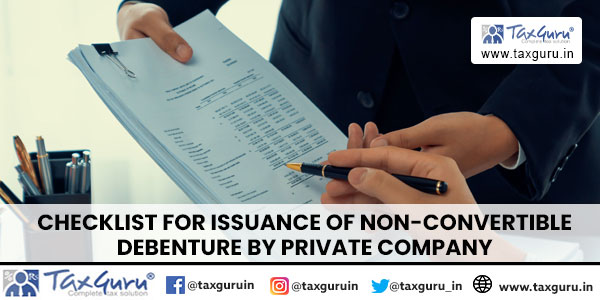Summary: A debenture is a debt instrument issued by a company as per Section 2(30) of the Companies Act, 2013. It can be convertible, non-convertible, secured, or unsecured. Private companies can issue only secured Non-Convertible Debentures (NCDs) unless they are listed on a recognized stock exchange. If an NCD is neither secured nor listed, it is classified as a deposit, making deposit-related provisions applicable. The issuance of NCDs by a private company must follow a private placement process, adhering to a structured checklist. Key steps in NCD issuance include issuing a Board Meeting (BM) notice at least 7 days prior, holding a BM to approve the NCD issuance, drafting and authorizing PAS-4 and PAS-5, and opening a separate bank account. If the issuance exceeds limits prescribed under Section 180, General Meeting (GM) approval via a special resolution is required. The company must file MGT-14 within 30 days of passing the resolution and circulate PAS-4 only after MGT-14 filing. The company must also receive funds in a designated bank account and call another BM for debenture allotment, charge creation, certificate issuance, and trust deed execution. Forms PAS-3 and CHG-9 must be filed within stipulated timeframes. A Debenture Redemption Reserve (DRR) account must be created, and a register of debenture holders maintained. Since debentures do not carry voting rights, debenture holders cannot influence company decisions.

Meaning of Debenture:
As per section 2(30) of the Companies Act, 2013 debenture includes debenture stock, bonds or any other instrument of a company evidencing a debt, whether constituting a charge on the assets of the company or not;
Provided that—
(a) the instruments referred to in Chapter III-D of the Reserve Bank of India Act, 1934; and
(b) such other instrument, as may be prescribed by the Central Government in consultation with the Reserve Bank of India, issued by a company,
shall not be treated as debenture;
Debenture can be issue in form of Convertible Debenture, non-convertible Debenture, secured Debenture or unsecured Debenture etc.
Let’s Discussed Issuance of Non-Convertible Debenture (NCD) by Private Company:-
A private company can issue only secured NCD. As per the deposit rule 2 (1)© if a company issue NCD it must be secured by the company or it must listed on the recognised stock exchange.
If a Company issue NCD which is neither secured nor listed on the stock exchange it must be treated as deposit and all provision related to deposit is applicable on it.
A private Company can issue NCD through private placement.
Check List for issuance of Non-Convertible Debenture through private placement
| S No. | Procedure | remarks |
| 1 | Notice of BM | Notice must be sent before 7 days before the BM |
| 2 | Call a BM for
1. Issue of Non-Convertible Debenture through private placement 2. Authorization for draft PAS-4 and PAS-5 3. Opening of Bank Account 4. Appointment of Debenture Trustee if applicable |
A separate bank account must be opened by the Company |
| 3 | Notice of GM | No need if debenture is within the limit prescribed under Section 180 of the Act otherwise members approval by way of special resolution is required |
| 4 | Call a GM for
1. Issue of Non-Convertible Debenture through private placement 2. Approval to PAS-4 and authorization to circulate the same to the identified person 3. Appointment of Debenture Trustee if applicable |
|
| 5 | Opening of Bank Account | |
| 6 | Filing of form MGT-14 | Filed within 30 days from the date of resolution |
| 7 | Appointment of Debenture Trustee before the issue of prospectus or letter of offer for subscription of its debentures. | Not applicable as the number of debenture holder does not exceed 500 |
| 8 | Circulation of PAS – 4 | PAS – 4 was circulated only after filing of MGT-14 with the ROC |
| 9 | Preparation of PAS-5 | |
| 10 | Amount received by the debenture holder in separate bank account opened by the Company | |
| 11 | Call BM for
1. Allotment of Debenture 2. Entered in to an agreement to create a charge in the property of the Company 3. Issue of debenture certificate 4. Execution of trust deed |
|
| 12 | Filing of PAS-3 | Within 15 days from the allotment |
| 13 | Execution of trust deed if applicable | The Company not later than sixty days after the allotment of the debentures, execute a debenture trust deed to protect the interest thereon |
| 14 | Creation of DRR account | |
| 15 | Debenture does not carry any voting right | |
| 16 | File CHG-9 | Within 30 days from the creation of charge |
| 17 | Preparation of Register of Debenture Holder |




